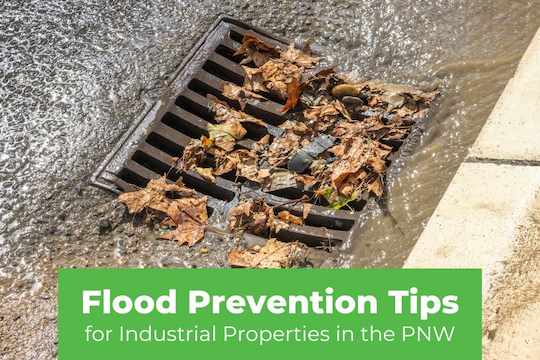How do you prevent flooding of a commercial property? Most property managers suggest that managing stormwater in commercial buildings is a complicated activity best left to experts. While doing so may be partially correct, there are some things that you can do in-house with your maintenance staff. What does this look like?
The Buck Stops With You

Refrain from counting on the commercial properties up the street to have excellent stormwater management practices. In other words, be prepared to prevent water from flooding your building, which should have been managed farther up the road. Stormwater management at your property will involve effective drainage, collection, and the subsequent treatment of stormwater. A proactive approach ensures your property is ready for weather events and reduces liability risks.
What Happens If You Do Nothing?
Managing stormwater runoff starts before it rains or snows. When it is dry, the best time to maintain your stormwater management system. Failing to take advantage of dry times will likely lead to problems.
- Property damage: Flooding water enters underground spaces like parking garages and storage areas. Above ground, standing water enters minute cracks in your parking lot's asphalt. When it freezes, the water turns into ice and expands, damaging the blacktop.
- Erosion: Runoff results in erosion around roadways and paths, damaging these areas and making them susceptible to future damage.
- Flooding: Conversely, your landscaped areas will flood. Because most ornamental plants cannot withstand periodic flooding, you will likely need to replace the landscaping after the runoff.
- Pollution: One of the most serious outcomes is water pollution. Improperly managed stormwater easily picks up contaminants and carries them into the water supply. Polluted stormwater is the number one threat to the Puget Sound.
Steps Commercial Property Owners and Managers Can Take Today
Managing stormwater in commercial buildings is simple enough. Something as straightforward as swapping impervious surfaces for permeable ones is an excellent idea. Do it anywhere you have flat surfaces, like parking lots or sidewalks. Install rain gardens, retention ponds, and drainage systems. If you do not invest in a property upgrade, work with the stormwater management tools you already have.
Keep Drains Clean

Train your maintenance crew to keep drains and water pathways clean. Remove debris, trash, and storm-damaged branches and leaves. These need to be bagged and disposed of properly. Allowing them to enter the underground portion of the stormwater management system could lead to backups, additional flooding, and system damage. Regular training sessions on best practices can ensure consistent maintenance results.
Visually Assess Your Drainage Setup
Do you notice areas of flooding? Does it smell like water is fouling on your property? Take advantage of input from tenants or staff who may notice water-related problems you have yet to see. Carefully record these observations and address them as part of a larger maintenance plan. A detailed log of issues can help prioritize repairs and ensure nothing gets overlooked.
Let Experts Support Your Commercial Building's Stormwater Management
Once you have done what you could above ground, it is time to call in the specialists. These professionals bring the equipment needed to inspect underground stormwater drains, note crumbling infrastructure, and devise a storm drain management plan to ensure the top functionality of your system.
Advanced Strategies Specialists Use
- Pipe jetting: Specialists use pipe jetting to clean storm drains and pipes. It removes clogs and washes out trash and detritus.
- Basin cleaning: Experts clean out catch basins, which manage water flow. Removing trash and sediment keeps these systems functioning efficiently.
- Filter cleaning: Storm filters capture pollutants like oils and pesticides. Regularly cleaning or replacing filters is essential to maintain water quality.
Managing stormwater in commercial buildings may also require pond and bioswale remediation. These tools catch runoff and slowly release filtered stormwater. Bioswales, in particular, use vegetation to slow and filter runoff. When they no longer function well, pollutants can enter waterways, and erosion may weaken the system’s effectiveness. Experts can assess the overall functionality of ponds and swales and return them to optimal performance. Partnering with specialists ensures these features remain assets to your stormwater management system.
Working With Stormwater Specialists
CatchAll is one of the local companies that is ready to clear storm drain setups whenever necessary. Our team offers a broad range of services, including:
- Catch basin cleaning
- Pipe jetting
- Storm filter cleaning
- Pond and bioswale remediation
Any project begins with a comprehensive inspection. These inspections help you and the team collaborate on a stormwater pollution prevention plan. Because compliance with municipal rules is critical, the inspection and subsequent work ensure you remain fully compliant.
Another advantage of this step is setting up your system with a regular maintenance plan. Regularly maintaining your site will reduce the likelihood of expensive repairs. Since the team inspects your system consistently, you’ll know about potential service needs ahead of time. This proactive approach informs you about your stormwater management system's overall functionality. If, at some point, you decide to make changes, the team can advise you on the best options for your location.
Planning for the Future

Consider incorporating technology into your management practices to future-proof your property’s stormwater system. Additionally, implementing sustainable landscaping practices, such as planting native vegetation, can reduce runoff and improve water absorption naturally.
Collaborating with local environmental organizations can provide resources and funding opportunities for stormwater infrastructure upgrades. Many municipalities offer grants to encourage the adoption of green infrastructure, such as rain gardens and permeable pavements, to manage stormwater more effectively.
Conclusion
Setting up an appointment is quick and easy. CatchAll Environmental specializes in all aspects of commercial stormwater management. From inspections to cleaning and repairs, we use advanced equipment and techniques to keep your property compliant and protected. Partnering with a trusted stormwater management company ensures your property remains flood-free and compliant with regulations. Make the call today to schedule an inspection!













